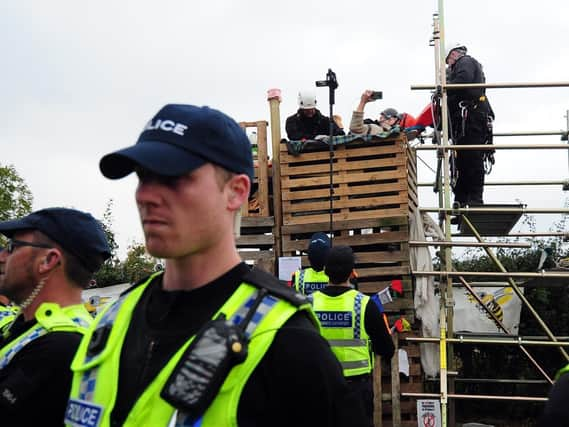Return of fracking to Yorkshire would be bad news for policing - Alan Billings


A couple of years ago we saw in other parts of the country – including Kirby Misperton in North Yorkshire – just how big and, at times, how robust and even violent those protests can be.
Some protestors will live locally. They are anxious about seismic activity and the volume of traffic the site can generate. They may be vociferous and persistent, but are not generally violent. But there are also those who live elsewhere, who feel strongly about environmental concerns and who can sometimes be confrontational and use tactics that are very difficult for the police to deal with. In those other places we have seen protestors encase their arms in concrete, chain themselves to machinery, jump on lorries, and so on.
Advertisement
Hide AdAdvertisement
Hide AdThere are two sites that will affect us in South Yorkshire – Woodsetts and Harthill. The Woodsetts site was refused planning permission by Rotherham Metropolitan Borough Council in 2018, but Harthill was granted permission to drill following a public enquiry. However, all activity at all sites ceased when the government announced a moratorium on fracking in 2019.
Now, the new administration takes a different view and has already said that they will ‘end the moratorium on extracting our huge resources of shale, which could get gas flowing as soon as six months, where there is local support for it’. This is part of the commitment both to ‘grow the economy’ – ‘growth, growth, growth’ – and find alternative sources of energy.
Much will depend on how ‘local support’ is to be measured and by whom. How local is local, for instance? And will local opposition melt away if the drilling companies offer to finance community facilities?
It is also possible that local opposition will be so great and so determined that permission to drill is never forthcoming. But we cannot be sure. And it does seem strange that the government would be so determined to end the moratorium on fracking if it believed that local opposition could not be won over.
Advertisement
Hide AdAdvertisement
Hide AdThere are also knock on effects. The dirty water that comes out of the ground as a result of fracking is taken to plants to be cleaned – one of which is in Sheffield. This too could become a focus for protest.
If there are protests at fracking sites, the police cannot take sides in these disputes. They have no view on fracking one way or another. What they do have to do is balance two sets of rights which may be in conflict. On the one hand, people have a right to protest and the police have a duty not to interfere with that right. On the other, people have a right to go about their lawful, day to day work. The police find themselves caught in the middle.
We have seen in other protests how hard it is balancing competing rights when a peaceful protest becomes more disorderly or violent. When far right groups – principally the English Defence League (EDL) – were protesting month after month in Rotherham about child sexual exploitation, I received complaints from two sets of protestors – supporters of the EDL and those who opposed them. The EDL supporters said the police were heavy handed. Those who opposed them said the police were not doing enough to stop them inciting racial hatred and dividing communites. Since part of my job is holding the police to account for what they do, I needed to know how they handled the protests. I couldn’t simply rely on what I was told either by the police or the protestors.
This is why I set up an Advisory Policing Protests Panel (APPP). The Panel – three or four people mainly drawn from the Independent Ethics Panel – received a police briefing before a protest, watched what happened on the ground and reported back to me and senior officers with any observations. We used the APPP again during the Trees dispute in Sheffield. (Her – now His – Majesty’s Inspectors commended the work of the panel and said other forces should follow our example.) In this way we could act as a critical friend to the force and help improve how they responded to demonstrations and protests.
Advertisement
Hide AdAdvertisement
Hide AdBefore the fracking moratorium, when it seemed as if drilling might take place at Woodsetts, I visited the site. It is a vast area of open countryside, approached by narrow country roads, with many potential means of access to the site for protestors. It would require large numbers of officers to police it. As with the protests in Rotherham and Sheffield, it would either take officers from other duties or require extensive and costly overtime, eventually leaving the workforce exhausted.
It is possible that the Prime Minister’s commitment to ‘listen’ to people may be kept and no fracking will proceed without the genuine consent of the people of Woodsetts. But similar promises were made about supporting Sheffield-Doncaster airport, and no help has been forthcoming there. So we must assume that fracking is a possibility. I have, therefore, revived the APPP.
Even if the people of Woodsetts accept financial compensations and agree to fracking, there will still be protests. And we shall all still have to pay for the increased costs of policing, which in these rural settings will be considerable.
Dr Alan Billings is South Yorkshire Police and Crime Commissioner